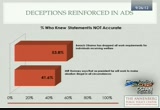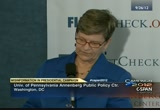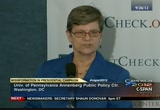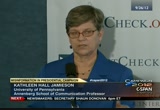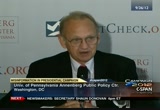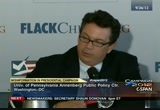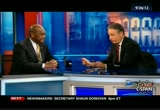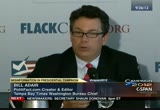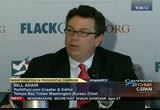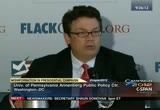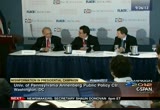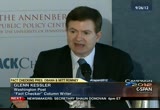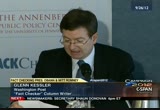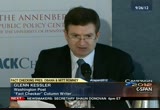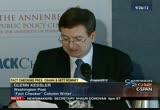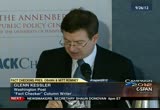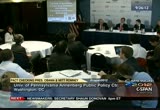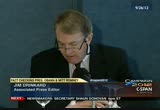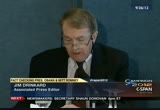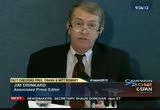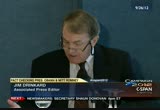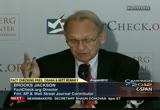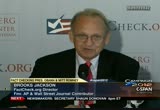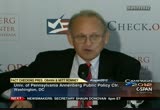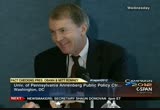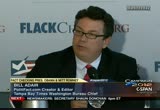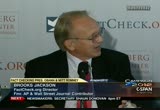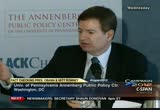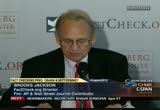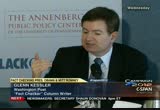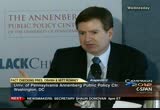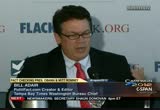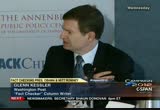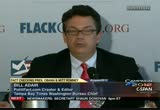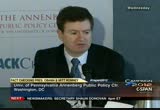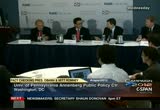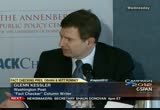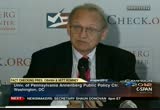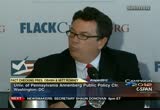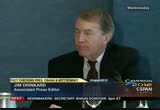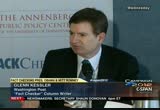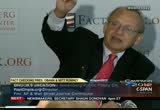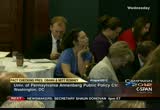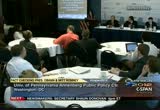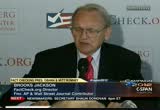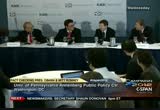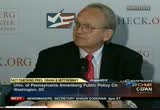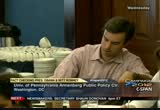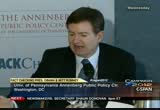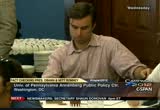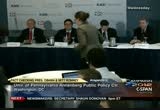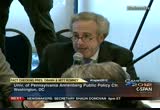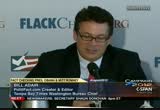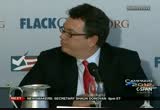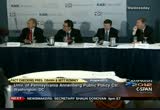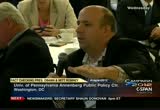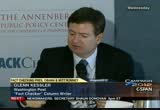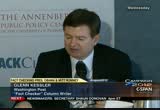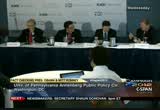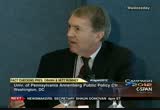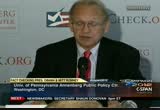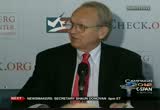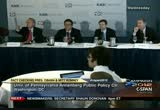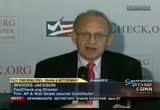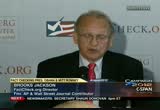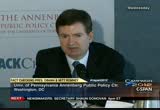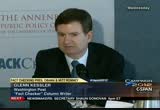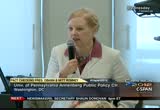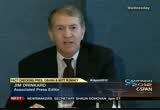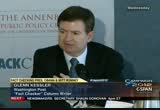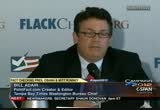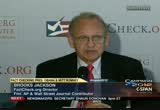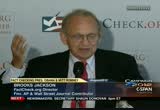tv Fact Checking Campaign 2012 CSPAN September 30, 2012 4:30pm-6:00pm EDT
4:30 pm
been reinforced a lot in advertisements. 53.8% know that the statements are not accurate. barack obama has dropped all work requirements for individuals receiving welfare. 53.8% now that is not accurate. the rest either have the answer wrong or say they do not know. 41.6% know that this statement is not accurate -- mitt romney says that as president he will work to make abortion illegal in all circumstances. deceptions in ads being believed need more public knowledge. next slide. on matters of background knowledge, in which the item was in the news for an extended period, they have higher levels of background base knowledge. these are not contested claims, so we would expect the knowledge level to be higher, but we are right around 70% who know the supreme court held that a fine in the affordable care
4:31 pm
act was constitutional since it was a tax. roughly the same, -- the percent that knew that the decision to downgrade the american economy from the highest credit rating, standard and poor blamed both democrats and republicans for the downgrade. when news media concentrates over extended periods of time over a matter of importance to the public, public knowledge rises. we have a public capable of learning. we do see increases in learning as news attention increases at debates focus more intensely on contrasting positions. next slide, please. we see that seeking at fact checking, a fact checking or news site, in order to find out whether a statement by one of the presidential candidates was
4:32 pm
correct or not is associated with higher levels of knowledge. the controversy this year about whether fact checking matters -- this association would suggest it does. there's the question, did more knowledgeable people simply come to the site? we have the causal inference wrong. in order to tighten down that inference, we control for those factors that might increase knowledge, such as closely following the campaign, education, ideology, gender, and the like. it does not establish a causal inference, but increases the likelihood we have the direction of causality correct. we do need to go into a controlled experiment. we will report one of those in
4:33 pm
the second panel. its conclusion will be the same. fact checking by the flack check model, visual debunking of visual claims, produced the same findings. as a result, we do think that the additional, argument for causal direction is that fact checking sites and the news area on the web, as long as this -- as well as stand-alone websites, can increase public knowledge. with that as a background, it is my pleasure to introduce brooks jackson. the first panel will discuss what it sees as possible and we hope not actual deceptions of the presidential debate. >> thank you. i know the assignment we were given is the title -- fact checkers forecast deceptions. it was not forecast whether or not there will be deceptions. when we put this up to our colleagues and kick it around formally, nobody pushed against the premise. if any of you think there will be no deceptions during the debate, please feel free to say so. i will introduce my colleagues
4:34 pm
and analysts here. each of them is going to give their prediction about next week costa made. we will start off with bill adair, director and founder of the pulitzer-prizewinning site politifact.org. a journalist of many years' experience here in washington. bill, what are we going to see? >> we had a discussion last week about what we expected. i offered to be a little contrarian. glenn made the point he did not think mitt romney would use the line is that we have all been discussing so much -- that kathleen mentioned in the survey -- the claim that obama has gutted welfare reform. i am sure you have seen that if ad that all three of us have
4:35 pm
debunked. i want to play a short video and -- as an example of this, and talk about why -- this is a video from the republican convention. >> i will be the first to publicly say i was wrong. my objective is for people to know the facts and the truth of all of this stuff. >> you know what you should do? you should go on some kind of truth tour. >> as a matter of fact, i already have. >> or what? that sounds crazy. what is it called? >> it is called the truth tour. [laughter] >> where is it going to go? >> 30 states, 30 cities. [laughter] >> this is from politifact. [applause] they checked a romney campaign claim that obama will end welfare work requirements,
4:36 pm
rating it "pants on fire." that, i believe -- i do not know what that means, but clearly that would be uncomfortable. in reality, the obama administration has said it will consider proposals from states aimed at finding better ways of getting welfare recipients into jobs. factcheck.org and the washington post fact checker have said the same, that the claim is false. [applause] what do you say? >> allow me to respond. >> the truth tour begins tonight. [laughter] >> i should have set that up to point out that the beginning of that was hermann cain maintain the same point the romney campaign had, that the obama administration is getting rid of the work requirement.
4:37 pm
what i thought that showed was the importance of fact checkers in this campaign. i really think, and brandon and glenn and i were talking about how things are different this time compared to 2008. there is more fact checking than ever, and the fact checking has a much greater prominence this time. candidates are being asked about it. i got a call from cnn last night -- they had asked mitt romney in an interview about how the fact checkers had looked at that and other ads. this year, more than ever, there is fact checking.
4:38 pm
this year, more than ever, fact checking is playing a role in the campaign. i think the survey indicates that people are better educated when they come to our site. in addition, the rest of the media is talking about our work in great ways. i think that when you look back on this election, we will say, this was the year of the fact checker. this was the year that fact checking really hit critical mass. let me get to predictions -- i think this will come up in the debate. not because mitt romney will bring it up, but because he will be asked about it by one of the moderators. but the romney campaign has shown no signs of pulling back on this. i got a mail -- i live in
4:39 pm
virginia -- i got a mail at my house for my daughter, who registered to vote a week ago. it repeated all the lines in the welfare at. i think the romney campaign has found a message that it once to -- wants to keep hitting. i think that will come up in the debate. we will hear from obama. initially, we saw this in the polls, this has resonated, their traditional scare seniors about medicare tactics. that has been working really well. so i think obama will bring that up. one thing we will hear is the phrase that romney would end medicare's guarantee, which is a phrase the democrats have liked to use recently. we have raided that half-true for two reasons. one, it is not like it really has a guarantee now. congress can change the medicare benefits any time it wants to.
4:40 pm
it frequently has. now, romney would change the structure in which people would pay for medicare. it would go from being -- it would turn into the essentially a voucher plan. in that sense, we found some truth and rated it as half- truth. >> thank you, bill. our next prediction from glenn kessler, checker of facts, awarder of pinocchios. what will we see? >> i have two. they both deal with medicare. one thing i always say, the more complicated a subject is, the more susceptible it is stretching the truth.
4:41 pm
when it is complicated, you can make assertions that a lot of times journalists do not have the time or inclination to check. i do want to say one thing about welfare -- the reason i said i did nothink romney would bring it up is because he did not mention it in his campaign speech. the issue is a very complex one with many sides to the story. though i did write the run the ad with four pinocchios. it really went over the top with the extreme interpretation. the obama administration's counter-spin leaves a lot to be desired. there is something very fishy going on with the issuance of the memo over the summer -- the people behind that now in the administration are skeptics of the welfare law. i have not gotten to the bottom of it, but i have given the obama campaign through -- three pinnochios for their counter- spin, particularly the way president clinton spoke about it. i did not think romney would necessarily bring it up himself in the debates because it would allow for a very muddy back and forth between the two men. in debates your most effective when you can make a clean shot. and resonate with voters. my predictions -- romney will repeat his claim that obama cut
4:42 pm
$700 billion from medicare. during the primaries, the republicans used to claim that obama funded his health-care plan with $500 billion in cuts. how did it balloon to $700 billion? a simple explanation. the congressional budget office is in a new estimate based on a different and later 10-year time line. republicans decided to pick the biggest number possible. medicare -- spending is not being reduced. $700 billion -- that comes from the difference over 10 years between anticipated medicare spending, what is known as the baseline, and changes the law makes to reduce spending. the statement -- that is mostly come out of health care providers, not medicare beneficiaries. the medicare actuary has raised significant doubts as to whether any cuts would take place.
4:43 pm
they are actually a bit onerous. according to the medicare trustees' report, propose reductions in spending actual strength in the long-term health of the medicare program. in fact, house republicans adopted many of the same cuts in their own budget. a point that bill clinton made rather effectively in his speech to the democratic convention. they argue that they devote savings to reforming medicare, not funding new entitlements. that is an important difference. both parties agree that controls are needed on medicare spending. but they disagree about the best path for. this claim by the republicans, i give it to pinocchios. obama will claim that are ryan's plan for medicare will for seniors to pay $6,400 more a year to make up for cuts in the program. this is an old democratic attack that has been around for
4:44 pm
a while. the problem is it is based on an earlier version of ryan's plan. that is another thing i have given two pinocchios. people should always be aware of dire predictions far off in the future. the $6,400 figure refers to an analysis of cbo estimates of a different, less generous ryan plan that goes to the year 2022. they make no estimates of the new version, except to say that beneficiaries might face higher costs. the plan was changed in other ways too. it changed the option of traditional medicare. it also decided to set the feature growth rate for medicare to the same matter accused by obama in his budget so there would not be a difference there. a study published recently by a journal of the american medical association suggests the average cost to additional medicare would be on the $800 more a
4:45 pm
year in the ryan plan if it had been in place in 2009. that is obviously significantly lower than $6,400. strangely, president obama was at the aarp last week, and he used the $6,400 figure, which appears in many of his ads. then he added something, that was in his original plan, i want to be fair, he modified it, because obviously there was a lot of push back from seniors on that idea. will have traditional medicare stand side-by-side with the voucher program, no current beneficiaries will be affected. it was so striking that he would undercut the message of his own ad. the headline on his remarks, "obama plays fact checker in chief." it was an interesting moment when the president, in effect, indicated his advertisements for using simplistic and out of date figures. i wonder if romney will call him out on it in the debate. >> my third colleague, james
4:46 pm
drinkard, is at the associated press, where i started many years ago. jim, i am looking at the combined experience appear of covering washington, all the baloney that its issue here. we have among us more than a century of dealing with these kinds of issues. jim, your prediction. what are we going to hear in the debate? >> there is a pattern here. you can see that it follows the social science dictum that the best predictor of future behavior is past behavior. as a wire service guy, i am not in the prognostication business, but i feel fairly safe going out on a limb in a couple of things today. eight months ago, in the state of the union speech, obama issued an appeal to congress to spend more federal money on construction projects that would generate jobs. what he said was, take the money we are no longer spending at war. use half of the to pay down our debt.
4:47 pm
use the rest to do some nation building right here at home. we pointed out in a fact check that night the fallacy of that idea. the idea that some kind of budget surplus is going to be created when you stop the wars is fiscal fiction. those wars have been primarily financed by borrowing. if you stop the wars, you do not have new money, you just have less debt being added. it does not treat a pool of ready cash. on top of that, the supposed savings of this supposed peace dividend is inflated because it is based on spending numbers that are extrapolated into the future that would come from the height of the intensity of the war and they do not follow the downward trend that it has been in reality. we pointed all that out in a fact check on a state of the union night. how does the administration react? three weeks later, the president
4:48 pm
issued a budget that claimed $850 billion in savings from the wind down of the wars and steered $230 billion of that highway construction. the president of the committee for responsible for budgets said the administration's logic was like a kid graduating from college who had financed most of his tuition with student loans and saying, wow, all that money, now i can spend it on something else. the reality is that there is no money. you are stuck with a bunch of debt. we fact check the budget as well. fast forward to the acceptance speech in charlotte three weeks ago. obama barely changed the word. he said, i will use the money we are no longer spending on war to pay back the debt and put more people back to work.
4:49 pm
after two wars that have cost us thousands of lives and over $1 trillion, it is time to do nation-building right here at home. since obama used pretty much the same words, so did we in our fact check that night. we recycled what we had used. when we were asked to predict mistakes candidates would make again in the debate, this one seemed like pretty much in natural. even before today, actually, last friday, in woodbridge, virginia, obama said again that he wants to use or savings to pay down the debt and put people to work. i think that is fair game for the debates if they go there. for romney, i have a prediction that i think is solid.
4:50 pm
it goes back to the title of his campaign book two years ago -- "no apology." ever since, romney has made a point to criticize obama every time he thinks there is any whiff of apology in something the president has said. i first heard it myself last april here in town, when romney was making a speech to a group of newspaper executives. he blamed obama for the anemic recovery and said, "obama's attention has been elsewhere. he was not focused enough on the economy. his attention had been on things like a government takeover of health care and apologizing for america abroad." in our fact check that day, we quoted what obama had said in overseas trips, including an assertion that at times the u.s. had acted contrary to its own ideals or had been selective in where it sought to promote democracy. it had sometimes shown an
4:51 pm
arrogance toward allies. we pointed out that when he made those kinds of statements that suggested the u.s. is not completely above reproach, he usually balance it with praise for things the country had done right. all that -- that is in a long acknowledging pastdents imperfections. these cannot by any normal dictionaries amount to apologies. either formal or informal. again, last month, when romney accepted his party's nomination, he repeated the assertion that obama had begun his presidency with an apology tour, and obama had confessed the u.s. had "dictated to other nations." that fact check story went into greater detail, pointing out that obama's trips to europe,
4:52 pm
latin america, to the muslim world during his first months in office, no indications were he had said the nation had made mistakes. in most of those cases, the context was a call for better relations with other countries after which he described as damage done by misguided moves by his predecessor, bush. so we fact check that. again, it did not seem to make a difference to the campaign. earlier this month, when that violence broke out at u.s. diplomatic outposts in libya and egypt. romney jumped to accuse obama of disgraceful handling of the situation, including sympathizing with those who waged the attacks instead of condemning them and making a "apology for american principles." we fact checked that, and we pointed out that neither an unofficial statement from the cairo embassy nor statements from secretary of state hillary clinton nor obama's own statement contained any sympathy for the attackers if you read the plain language of them. the administration's condemnation of religious incitement on the anti-muslim from did not come anywhere close to being an apology by any
4:53 pm
definition. i have a feeling that romney stands ready to apply this overly broad definition of apology at any opportunity in the debates or during the endgame of the campaign. >> thank you, jim. before i make my own prediction, i want to know something kind of remarkable happening in the last couple of days. both candidates have been askedf cbs. and referred to fact checking, their reaction to it. we have a clip of what president obama said in a "60 minutes," interview. it was kind of interesting. >> the fact checkers have had problems with the ads on both sides, and city have been
4:54 pm
misleading and in some cases just not true. does that disturb you? some of them are your ads. >> do you see sometimes us going overboard in our campaign, mistakes that are made? areas where there is no doubt somebody could dispute how we are presenting things? that happens in politics. people't the american entitled to the truth? >> the truth of the matter is that most of the time we're having a vigorous debate about our visions for the country. there is a lot at stake in this election, so is it going to be sharp sometimes? absolutely. people have a good sense of where i want to take the country, where governor romney --
4:55 pm
>> so there you have the president saying, well, do we go overboard and make mistakes, that happens. yesterday, cnn was pressing mitt romney on the welfare matter. that,e the statement well, whenever we have made mistakes or false claims, we have corrected them. are any of you aware of any corrective ads the romney campaign -- the romney campaign was not even when cnn pressed them for examples. they have not corrected anything -- romney seems to have stated that they have made some incorrect claims. i think that the likelihood is that we will hear some twisted or false claims coming out
4:56 pm
because this is not unique to this particular campaign. this has been going on for a long time. we have pretty strong evidence that the greeks holding forth in the agora in athens, 2500 years ago, were pulling the wool over the eyes of voters even back then. at least with obama, as of we have heard, he is somewhat more circumspect when speaking in person about his new ones and some of the things you hear coming out of his ads. in one case, he corrected or contradicted his own advertising. to make my predictions, i sort of threw darts at the claims they make in their stump speeches, romney and obama. we recently did takeouts on the standard speeches that they give. one from each side. i predicted it is quite likely that we will hear mitt romney
4:57 pm
say that gasoline prices have doubled under obama, which is an example of one of those things that is, yes, literally true if you look at where gasoline prices were when he took office. they have plummeted due to the world wide near-depression we suffered, but the fact is that they have never quite gotten as high under obama as they work for several weeks in the summer of 2008 under bush. i think we will also hear president obama say that we have created half a million manufacturing jobs. he will drop his voice and say, in the last 29 months, which is of course not his entire administration. he measures of the point where things have bottomed.
4:58 pm
we have regained fewer than half of the more than 1 million manufacturing jobs that have been lost on his watch. that is a better way of putting it. not false claims, but claims that leave a false impression if you do not look at them. i think we hear a lot of that. i will ask if you hopefully provocative questions of our panelists to get the discussion going before we throw it open to questions from the audience. are their claims for any of you, that they have made in the past that we have found to be false or badly misleading the they are not going to repeat for some reason? >> i feel fairly certain that we will not hear romney conflate the number of people who are bound to vote for obama, the number of people who do not pay federal income tax, and the number of people who receive some sort of federal benefit, that that is all the same 47%. i doubt we will hear that again. >> anybody want to disagree? >> probably not. i do not know if that -- it was for consumption by a very small
4:59 pm
public. those with big wallets. >> that gives you an important aspect of our fact checking. we focus on the big, national messages, but we know there is lots of micro-targeting going on that is using very precise media to hit very precise audiences. we are not seeing that. we try, we asked readers to submit ideas through facebook and e-mail and what ever. we get a tiny portion of that. i think the case in point, this mailing i got from the romney campaign, maybe that is not going to be a message we hear romney assert at the debate,
5:00 pm
but it is clearly won the campaign is continuing to make. talk to campaign people, they will tell you, hey, you do not know about the ads you did not see that are running in tiny markets in ohio and florida and what ever. i think there are plenty of those. >> what i am wondering about -- we heard one example of the president being more careful about the facts when he i think probably we will not hear barack obama claim that mitt romney favors a ban on abortion even in cases of rape or incest, a totally false claim and a misrepresentation of romney's overall stance. he has been consistent ever since he switched to -- to be in generally against abortion. he has not always had this position, but since he has adopted his present position, it
5:01 pm
has been clear. he has favored the usual exceptions. the obama campaign has in two tv ads repeated this utterly false claim. i do not think we would hear that out of the mouth of the president. do you share my view that the candidates are more circumspect in person than they are -- and their campaigns are in advertising? or is it just the president, not mitt romney? what do you think? >> particularly in a high-stakes situation like a debate, we are talking about the debates, i think it will be more circumspect. i cannot offhand think of a claim that they would or would not say, but it a whole different matter when you are right next to that person and they are able to respond and
5:02 pm
say, actually -- you saw during the campaign debates that there were moments when they would turn to each other and say, you got four pinocchios for that. that was pants on fire. you do not want to get into a situation where you are exposed in that way, particularly with the internet, people can quickly look these things up. i noted that when one of them said, you got four pinocchios about that claim, the next day i had tens of thousands of hits. people had gone to the web and looked up what newt gingrich was talking about. >> another question -- recently, one of mitt romney's operatives made the statement to reporters when they were pushing him on the claim about welfare. we will keep running that, we will not have our campaign did but -- dictated by fact checkers. probably a lot of news people were shocked by the cynicism they heard coming out of his
5:03 pm
mouth. jim, you have been around the longest -- did this surprise you? >> i really cannot say that i was. they had kind of behave that way all along. they were certainly not terribly worried enough to change the rhetoric when something is pointed out to them. >> you mean the romney campaign? >> yes. i do not see a lot of evidence of trimming statements back to make a more accurate when they are repeated -- >> i do not know about that. this is -- my take on this, in the context of that question and answer, they were saying that this is the most effective ad. they said, that got four pinocchios. the response was, we are not going to let our campaign be dictated by fact checkers. what he means by that,
5:04 pm
politicians in both parties will stretch the truth if they feel it will give them a political advantage. if that is the most effective ad, it does not matter what a bunch of nitpicking journalists might say about it. that ad moves people and has an impact. i have seen both obama and romney suddenly tweak or change or drop language called out by fact checkers. ultimately, there was a decision there that it does not mean that much to us if we fix this. we will get less grief if we treat it a bit or change it on the margins, but the key things that move voters, such as, he apologizes for america or obama with that ridiculous thing
5:05 pm
about savings from the wars, and in the same breath he criticizes george w. bush for running wars on a credit card. he will say those on this one sentence after another without any sense he is contradicting himself. there is pulling there that says that is an effective line and moves voters. it does not matter what the actual facts are. that is when -- >> in that statement, he also said, fact checkers come to this with their own sense of thoughts and ideas and backgrounds. he is trying to redefine what a fact is. he is saying, there are no objective facts. it is to somebody else's opinion about what we are
5:06 pm
saying. it is kind of like redefining apology. they are redefining what effect is. >> i do not want to be unfair to romney. my own view is that the attitude on the part of the obama campaign and the romney campaign was pretty much the equivalent. the surprising thing was that somebody from either campaign said it out loud. shocked news editors who had not been paying all that much attention previously. are the differences? to any of you see differences in the attitudes of the campaign apparatus is? >> i think what jim said about the no apology theme is the same thing applies for obama. campaigns are about themes and messages. the campaigns have decided that these are the five or six or however many things we are going to hit. we are going to have done repeatedly with as much evidence as they can muster. at some point, they have got to stretch the truth to make this point. both of them are doing it. we talk about abortion -- the
5:07 pm
interesting, here is how i could see the abortion one playing out. i think obama, i am sure, recognizes romney's current position on abortion, but i could see an exchange returns to romney and says, now, you did support the personhood amendment. could that not have the impact of outline all abortions, and put romney on the defensive and score the points they want to score and remain in the facts on that. of course, that is how they have tried to connect the dots on abortion, by taking romney's position there. i think it is all about themes. they have their themes and will keep hitting them. in some cases they have got to connect the dots that really are not there. >> do you see places were either campaign has paid a price for misrepresenting facts?
5:08 pm
>> it was pointed out, it was not for public consumption, but the conflation of those groups, there was a serious -- >> but for general consumption -- tv advertising, applause lines in the stump speeches, that sort of thing. >> i do not know. that is kind of depressing. >> if you follow the reaction we get -- >> in votes, or in the polls. campaign money, something that matters. >> you do have a control group or anything that you can tell that. i say, i do not write for politicians. i write for voters and try to make them better informed. politicians will react to voters. if voters decide it will extract a price when a politician has not been honest, then politician behavior will change. but because we read a bunch of statements that were not correct and they would have paid the price, i do not know. i did one thing on romney -- for a long time in his stump speech he would say the united states was the only country on
5:09 pm
earth where we put our hands over our hearts when we sing our national anthem, which was quickly disproved by just looking on youtube. people around the world going like this and singing their national anthem. he dropped at the very next day. he never said it again. >> he paid the price. >> maybe. >> i would say that is an example of actually changing behavior, which i think happens rarely and in small increments. >> i think the other thing we were talking about before the panel with brendan, the other thing we do not know, how many conversations are going on with campaign message people, with people making ads, with speechwriters, they are talking about wording. how often are they saying, if we say that, the fact checkers
5:10 pm
will get us? i suspect that is happening a lot. the only evidence i have of that is a column written by connie schultz, who is married to sherrod brown, who says that happens in the brown campaign. i suspect that is happening in many campaigns. there is so much fact checking going on, not just with our organizations, but with others. we have partners in 11 states. there are newspapers and website around the country doing fact checking. there are a lot of eyes out there. >> that suggest, if things are
5:11 pm
that closely vetted and mauled over before they are said, especially speeches at the conventions, when they come out and repeat things that they know are going to the fact that again, that suggests there is no price. they have concluded that the price is so small that they are willing to -- >> there may be a price, but it is balanced against the fact that it is a tested and the fact of life that moves voters. you do a cost-benefit analysis, like anything in life, the benefits quickly away the costs of yet another column in "the washington post" or the associated press that says there is no money there your saving from ending the war. >> it happens. >> sometimes i am struck by the aggressiveness of the ads, compared to what comes out of the candidates' mouths. do you see a difference in the attitudes of the operatives grinding out these ads, when they then have a little video of the candidate saying their approval of this when they have not even seen it? are the candidates even in charge?
5:12 pm
>> the super pac's -- i did have a conversation with one guy who runs a super pac. this was after he was screaming at me about something i had written. he just laughed and said, you know, i actually do not care about what you say, because these ads work. he said, these ads work. they move voters. so what? i do not care what you are right. give me as many pinocchios as you want. these things work. he was very up front about that. >> some observers have suggested that campaign staffs now see it almost as a badge of honor to be called out by one of us or all of us, showing that they are tough and getting the job done. has it gotten that bad, do you think, is there that much
5:13 pm
cynicism in the campaign operation? >> judging from the complaints we get when we write these things, i would say they still care about us. to some extent. they may not think the price is affordable, but we certainly get push back when they think they have been treated unfairly. >> talked about that one point. talk about post-modern truth or whatever. you can look at a set of facts and draw a different conclusion. there are times and we have looked at the same set of facts and do not come to the same conclusion. some of the push back to get from the campaign's, they say,
5:14 pm
you may think that is factually inaccurate, but we think that is factually accurate. who are you to sit in a judgment? >> the welfare ad is a good example. there is a strong current on the republican side that says that this looks -- there is no trust here. this looks like an attempt to undermine the work requirement in the current law. we are sort of being asked to fact check the future here. because it has not happened yet. you cannot read people's intentions. you have to listen to what
5:15 pm
people say. what they put on paper. what they have outlined. make some judgments about it. we will not know until the waivers are implemented, exactly how they are to be used. >> well, we now have some time for questions from you in the audience. if you would like to know how we go about our business. please identify yourself and give us your question. wait until the microphone comes. >> high. i have been working with the league of women voters in a project to help support tv stations when they do this. one of the things we are beginning to hear back from some of the television stations around the country is they do not have the resources to fact check.
5:16 pm
they have turned around and said, can you help us? we have obviously noted the work you have, but many of these television stations and to some degree newspapers are saying they do not have the resources to do the fact checking they would like to do or we would like them to do. particularly in this new economy. how you respond to those tv stations or to those newspapers to say, yes, we would like to do this, but we do not have the resources? >> let me first say we have partnered with primarily newspapers, but also with public radio in 11 states. we have found a very successful way to scale fact checking. we now have 11 state politifact sites where we have trained
5:17 pm
journalists at newspapers and new hampshire public radio how to do fact checking. they do it. it does not have to be a big organization. they do not have to put up multiple people. we have 36 full-time fact checkers around the country. we've talked to tv stations. none have been willing to make a commitment to it yet, but i can see that happening. tell them to call me. >> also, sort of a partial answer -- when campaigns put out new ads, the ap tries to look at them and do what we call an ad watch. it is a fact check version just for television ads. we try to do those in the first day or two after a new ad comes out. we cannot do all of them, but if an ad happens -- they are dealing with happens to be one of those, there may be some resources on the wire.
5:18 pm
if they are micro-targeted ads we are not even seeing -- we only treat the ones we see that look like they will get wide distribution around the country. generally the ones going into the battleground states. those are available. >> the only thing i would add -- i am not an empire builder like bill is here. i think obviously those stations to have reporters that cover politics. there is nothing that says you need to have a dedicated fact checker operation. if you are covering politics, you should be able to set aside some time to say, ok, let me that what the candidate has been saying. when i was covering the 1996 presidential election, i came up with an idea to fact check what dole and clinton were saying. i came up with time to lay it out -- it was on the eve of the debate. this is what is true and is not true.
5:19 pm
they have the resources. it does have to figure out how to take those people and deploy them effectively. >> i have two quick observations. it does not take a huge staff, for one thing. you have the resources of all the fact checkers up here before you, and others in the media doing these sorts of things. anybody who wants to do this sort of thing at the local level can draw on an awful lot of work that has already been done just by reading what is up on our side. when i started, when kathleen brought me over to the annenberg center from cnn, i was doing this by myself with the assistance of one researcher and later two in the 2004 election. we have expanded -- we now have
5:20 pm
5 full-time journalists besides myself for this election. it needs to be a smart, good reporter who has been around the track to times and has been applied to and can recognize the sort of thing and deal with it. you do not want to give this to the latest new hire out of journalism school, but my second observation is, ask the station manager how much money they are getting from the political ads that are running on their stations and why they do not devote half of 1% of their profit to telling people that the stuff they are feeding the public is not necessarily true. what is their moral obligation there? maybe they do not have a big staff, but it is not as if they are not making pools of money on these false ads. if they have the money resources, it is just a matter of how they choose to deploy
5:21 pm
than. >> other questions? >> from the national institute of civil discourse. jim started with the example of how effective it has been, the 47% of people not paying income tax, that is falling out of speeches. you brought in micro-targeting. this particular fact, in terms of responses we get from the public, has clearly stuck. people are repeating it -- ordinary people, not media. my question is, given this campaign consultants -- every cycle, their goal is how to get more and more sophisticated about micro-targeting. in this campaign, with so few undecided voters, i wonder if you are collectively starting to think about how to take fact checking into the micro-
5:22 pm
targeting area, particularly at this late stage in the campaign? >> i think the challenge is to find out what those messages are. if the campaigns are using social media in very targeted way, it is not been seen by us. it is a tv ad only airing in a small market in florida, there may be nobody there who thinks to say, hey, politifact florida, why don't you look into that? so i think that is an aspect where we can build, i think, some crowd-sourcing network that highlights. we will get a little bit of feedback, but it has not yielded the great response that we would like, but i think that crowd-sourcing is it maybe. >> we had something called spin detectors, with a box on our home page, and we have been asking for people to send us examples of this sort of thing, and that if they get targeted mailings, robocalls, what are they seeing in their inboxes
5:23 pm
that gets sent to them, but he is right. they do not send these things to reporters. it is not like they are putting it on a television station, where it can be monitored, and we can see every ad that they put on, but there is a huge potential for flying under the radar, and telling targeted groups of voters the things that are not true. i do not know that it is going on. i assume it is going on to some degree. how great of a degree, i do not
5:24 pm
know. limited success. if anyone who is listening has seen something like this, let us know. one of the challenges, too, my experience in covering these sorts of things for a long time is that these tend to flood in in the last few weeks. the money gets spent on these big postcards. your inbox just fills up with these things in the last weeks of the election, and that makes it very difficult for us to parse through these things and do any sort of pushback before the election, but we would like to do it, and we would like to do more than we are doing. jim, do you have any thoughts
5:25 pm
on that? the micro-targeting, or targeting in general? >> there are all sorts of things that you can plop into. i have gotten a few. not as many as i had liked. if you are out there, we are open for business. >> you can take part in this in that what we have seen in the targeted messages, they are basically repetitions of the same stuff we have already debunked, so i think we are saved by the limited imaginations of the people that are putting these messages out. in the back? >> i am michael, with "time" magazine.
5:26 pm
i am wondering if you could make any quantitative or qualitative judgment on whether this campaign has been more -- whether this is something that should be -- whether voters should, as an enforcement mechanism, whether they should have an idea of whether this campaign is breaking the rules on the honesty and truth -- >> the answer is no. i do not know any objective way to measure that, so we would not even try. even if we could come up with a scholarly, academic way to say that one candidate is being more deceptive than another, i think we probably would not, just because it would look like we are endorsing the other
5:27 pm
candidate, and it would limit our ability to persuade people of what the facts are. do you have a different opinion? >> i would agree, and it is a really tough thing. first of all, some of us have methods of trying to quantify the depths of the falsehoods, but it is a real continuum. there are a lot of misdemeanors as well as the felonies that go on, and how to devise some kind of a rating system for that -- the other thing is, you only fact check things that you see, and we try to fact check the things that are either the most widespread or the most egregious or the most interesting or the most clear- cut, so that leaves out some things. there is a lot of squishiness in intending to quantify it. >> i agree. i am not going to pick something that is stupid and
5:28 pm
silly, but i want to find a way to help people understand more about the budget or the health- care system. then that is something i will focus on, as opposed to something that is more of a slip of the tongue or something like that. politicians in both political parties will stretch the truth if it is in their political interest. there is no difference between the two on that score. maybe you can try to lay out that, oh, this particular candidate was more egregious in this campaign, but overall, if they think they can get away with it, they will stretch the truth, and it does not matter
5:29 pm
who they are or what political party they are with. it is just the way it is. >> i think the best thing to do is to focus on journalism, to fact check them and do the best journalism we can. we actually go the farthest of any of the four of us. politifact has a rating. we tally those ratings because our readers ask for it, but that is as far as we go. what is interesting, and i do not put a lot of stock in it,
5:30 pm
but it is fun to see what people do with our work. there is a guy in ohio that has a word in it that i cannot say on c-span, it begins "who is more full of," and i am not sure how revealing that is. >> the average pinocchio ratings, it gives an average. again, it is a little self selective in terms of what we look at. between obama and romney, and they are both in the two range.
5:31 pm
5:32 pm
i think we have seen in the campaign so far that both candidates are in the position of being challenged. flip-plopped positions. i have noticed so far that both governor romney and president obama, when challenged by a voter or a journalist, it is not to say, "well, the facts have changed at the facts are different. the facts i look at now are not the facts that existed when that was my belief." instead, there are levels of equivocation or bluff. i think one latino group challenged him on keeping the promise of immigration reform that he intended to make. right then and there, i was
5:33 pm
hoping the president would say, "well, the picture is different. let's look get it imperatively." instead, it was something like, "i meant i would try." why do they just cannot say that the facts have changed when it challenged on flip-flops? >> the obama promises, and the extent to which he has kept them or is working on them or has reneged on them, maybe you have got the most updated to respond to that. >> yes, we have a feature called the obameter, and it will be much easier next time.
5:34 pm
my sense is, one, i do not believe they get asked directly about these things, and it may not be that the facts have changed, more the calculation. if you look at health care, for example, there were promises he made about prescription drugs or medicare, allowing medicare to negotiate prices, things that he sacrificed as part of a deal to get the support of pharma, but i do not know if the white house has ever said that on the record. "hey, we made a calculation. we are going to sacrifice of those two," and some are broken because of gridlock in congress, others broken because the white house made a calculation, "hey, we are going
5:35 pm
to go for something else instead." >> there was one statement where he was not correct at all. in fact, we gave him two pinocchios. it was a difficult thing for him to answer, which would of been among the minds of what you're talking about with the health-care bill. "immigration reform was just not high on my list of what i wanted to do." instead, he portrays himself as a superman who could bound several buildings at a time but just could not do that one. >> next question. >> "the weekly standard." i want to pick on bill first. i am curious, because they have done a few studies. these are pretty easy to quantify.
5:36 pm
there was a study last year that found that republicans were at a rate of 3-1 over democrats, and i think there was a george mason university study that found it republicans to democrats 2-1. regardless of how they come down in the rulings. that, to me, it suggests that fact checkers have a partisan agenda that they bring to the table. it was not that he was going to go whole hog on something.
5:37 pm
>> i am not sure i would agree that they have been singled out. did not show we had looked at about the same number of democrats as republicans? i do not find the "hey, you, give my team" -- someone came up to me to say that there was bias against tim kaine, the democrats, and then about a week later, it was said about unfairly targeting republicans. i think what we do is disruptive to the status quo. we are easier to analyze
5:38 pm
because of our unique structure, but i do not find the numerical count analysis to be particularly persuasive. if you have a substantive questions about something we have done, -- if you have substantive questions about something we have done, we are happy to look at it. this is journalism. we are not randomly selecting things. >> just to follow on that, the way i do this is that i do not really look at who is saying the statement when i evaluate it, and i give a running tally.
5:39 pm
"here is how many democrats i have looked at. here are the republicans i have looked at. here are the averages." but i do not really look at it when i go out and fact check, and the interesting thing is, just in terms of the reader response, i would say it breaks down roughly three ways. one-third of the people kind of like what i do and send me nice and notes. one-third of the people think i am just a screaming conservative and cannot imagine why i am working at "the washington post," and one-third say i am a crazy, liberal hack that is simply doing the bid of the democrats, and it goes through cycles. brooks and i were slaughtered by democrats when we were raising serious questions about
5:40 pm
the obama campaign's comments about the timeline of when romney worked for bain. i do not know if this is your experience, but democrats tend to be more angry and more upset about some of the things that i write. i think they believe the myth of the liberal media. >> a couple of things. i think, in a lot of ways, what we were right -- we try to come
5:41 pm
at this dispassionately. people either criticize what you have written or are loving it. invariably, someone who reads a fact check that may be critical of their candidate says, "there you go again. you never fact check the other side," but we do. i also think when you have a scale to rate things on, you invite some of the numerical analyses. we are not trying to create something that is able to be analyzed in that way.
5:42 pm
we are in a year that has been dominated by a primary season where only one party had a primary, and they had 21 or 22 debates. that is going to produce a certain number of fact checks. there were debates in january. that will skew the numbers. >> are you done, jim? jim's observations are correct. when i first started
5:43 pm
factcheck.org, this was late 2003, we went live late in 2003, in the middle of the democratic primary process, they were all about democrats, because george bush was wisely keeping his mouth shut while howard dean and others savaged each other and told horrible falsehoods about each other. when we defend one republican against a falsehood said by another republican -- i have not rejected the idea that we are singling out either party for undue attention. if not, rachel maddow -- what he has said about liberals.
5:44 pm
she complains on the air time and time again about what he has said about liberals. what we do -- if i would fire a reporter for turning copy -- we look at all of the statements we possibly can. we love to debunk false claims. i think "the weekly standard" would agree. when we look at civil rights, it should be not about the quality of results. it might reflect that there is a republican primary going on, or it might reflect the fact that they are failing the same
5:45 pm
journalistic standards. i think this varies over time. that is just a false logic. i do not know that it is 3 to 1, and i do not know the time you're talking about. some of that is republicans criticizing other republicans. it is certainly not three to one on our side. other questions? we have two here, if we can get the microphone over to the
5:46 pm
table in front of the cameras. i am keeping her hopping here. >> i am michael, and given what we have just heard about people choosing to believe their side or their candidate or their team of people that believe they are objective journalists, and i count myself among them, and i do not believe that many voters believe that being a liar is a disqualifying traits. what are you guys seeing? what can happen on the ground because of fact checking? >> kathleen alluded to this earlier.
5:47 pm
there is some modification in behavior. i have not been aware of very much of that myself. i do not think what we do should be measured by the fact we have on candidates. there is too much for them to say what they need to to get elected. the campaigns are not public policy seminars. they are going to do what politicians have been doing for centuries. where i think we can have some effect, and i think where the
5:48 pm
evidence is coming out today that there is some effect, we can help those voters that care, and a lot of them do not. they are just going to vote for their person, no matter what, and they do not want to hear it, whether the candidate is saying something wrong -- that is fine. and you will hear more about this later. i think what the data is showing is that those who click into some sort of fact checking web site have better knowledge of what the issues are than those that do not. i think that is good for democracy. i think some of these results are pretty depressing about the general level of ignorance. they are exacerbating that
5:49 pm
rather than helping it in some cases, so we provide something of an antidote for that. that is my view. do you add to that? rebuttals? >> i write for voters, not politicians, and a large part of what i try to do, while i have these funny little pinocchios, my main goal is to inform people about major issues that confront this nation, and i provide lots of links to other research so people can go off on their own and troll through the data. some people say, "how can you say that is three pinocchios? that is one." if they go out on their own and learn more about the issues that confront our country, then i think it is a huge success. you look at the data of what americans think, how much money is made up of foreign assistance, i thinking it is 50% is foreign assistance, there is -- i think it is 50% foreign assistance, there is much more to be done. >> i want to hear about the use of websites and emails. our students are reading these, and the emails are fired off immediately after a convention speech or a speech somewhere, saying, "look what obama said.
5:50 pm
we want more money. let's not continue with this presidency." the curious who are interested in politics and news junkies, there are millions who are getting news this way, and i wonder if you are making any effort? >> it is a matter of triage. we tend to look at the things we think are getting the widest exposure, which means a lot of it is things on television, either advertisements or speeches or major events, news conferences. the kinds of communications you are talking about that parties send to their adherents, they are cheerleading. so it is no surprise that they may play absolutes with the facts on those things, and they are going to people. i suppose we could get into the
5:51 pm
business of fact checking those, but with limited resources, we tend to want to look at things that are said in an atmosphere where at least there is some pretense of objectivity and where it is going to go into a broad and general audience. >> i look at viral facebook posts, that either one side or the other has done. there was something based on something that the policy people put out. they're going to people who want to leave them by and large anyway.
5:52 pm
i suppose we could get into the business of fact checking those things, but with limited resources, we tend to want to look at things that are said in an atmosphere where at least there is some pretense of objectivity and where it is going to abroad and general audience. >> i make an exception for viral facebook posts and things like that that either one side or the other have done. there was one earlier this year which politifac fort also looked at which was based on something the pelosi people put out and it had this talk a mamie metric that obama had increased the debt the least of any president over the last six or seven. it was all over facebook. it just exploded among democrats. i think i ended up getting that four pinocchios and that became
5:53 pm
a viral facebook post from the other side. we also occasionally look that graphic elements that either campaign have put on their websites and there are assertions of fact there that are wanting in both cases. in the same way that chain emails became a medium for transmitting false information, facebook posts, which we call jpeg propaganda became a way to spread a lot of information, much of it exaggerated or inaccurate. for a while, we did a whole bunch of them. as jim said, the triage we have
5:54 pm
to go through every day, this gets to the challenge that at any given day, there are probably 50, 60, 100 things that we could check. and we have four fact checkers. we have to be selective. lately, we have focused entirely on the presidential campaign messages but there are a lot of interesting senate races. we would love to a fact check some of the claims in the massachusetts senatorial race but we do not have the staff. >> i think your question went to emails send to the campaign staff particularly. we have a whole section devoted to that and some of the step is amazingly delusional and we cannot resist going after it. i agree. we sign up for and we get the
5:55 pm
emails they send out of their supporters and they tend to be the same message is repeated over and over again. sometimes they do go over the top. just the other day, we got one from the romney campaign. i do not know what they were thinking after the fed had said they're going to go through another round of quantitative easing, printing money. here goes a message to donors, "barack obama is out again spending your tax dollars." two things about that. the fed is actually reducing the deficit and making huge profits returning record amounts of money to the treasury as a result of previous quantitative easing, so it's the opposite of spending your tax dollars. the fed a legally independent and ran by a guy originally appointed by george w. bush.
5:56 pm
this is just so completely over the top that we decided to do a piece on that particular email. pretty much, these messages to true believers have to exceed what we have already the bonds before we pay attention to them. we are out of time. thank you all for your attention. thank you for your questions. [applause] [captioning performed by national captioning institute] [captions copyright national cable satellite corp. 2012] >> monday, a citizen's guide to the 2012 presidential debate from the national communications association panel looking at the hours of the debates coming up next month. live coverage begins at 1:00 p.m. eastern on c-span. >> you established a third party. you ran twice. you established -- what was the name of it? united we stand?
5:57 pm
the reform party. do you feel that is needed today? there's something wrong with the two party system which has got more acrimonious with each party back on their 10-yard line. >> it's almost impossible to do it. it would be a healthy thing if you could get it done and make it happen, but it's very difficult to do and very few people would want to try because they know they're going to be butchered from day one for what they have done. much of the media will participate actively in that. >> watch the entire interview with former presidential candidate ross perot on monday. he is interviewed by usa today's richard wolf on the economy, the deficit, and the debt and how it has changed since he ran for president in 1992 and 1996. that is monday at 9:00 p.m.
5:58 pm
eastern. you can find richard wolf's article on "usa today' and on usatoday.com. tomorrow on "washington journal," previewing the upcoming supreme court term. our guest, correspondent from "the wall street journal," jess bravin. he will be followed by a libertarian presidential candidate gary johnson talking about the obstacles third party faces in the two party system. later, we talked about the more than $10 billion in federal funding for public transit systems including buses and light and heavy real. our guest is emil frankel. live at 7:00 a.m. eastern on c-span. -- "washington journal."
5:59 pm
>> c-span is not biased. there are no ads. i'm a firm believer that the c- span video archive is a gift to the american people. it is one of the most historical archives there are. i'm primarily watch "washington journal," the house of representatives proceedings and c-span2 for the senate. cableated by america's companies in 1979 and brought to you as a public service by your television provider. >> see the first of the presidential debates wednesday night live on c-span, c-span radio, and online at c-span.org. coming up, "newsmakers,"
709 Views
IN COLLECTIONS
CSPAN Television Archive
Television Archive  Television Archive News Search Service
Television Archive News Search Service 
Uploaded by TV Archive on

 Live Music Archive
Live Music Archive Librivox Free Audio
Librivox Free Audio Metropolitan Museum
Metropolitan Museum Cleveland Museum of Art
Cleveland Museum of Art Internet Arcade
Internet Arcade Console Living Room
Console Living Room Books to Borrow
Books to Borrow Open Library
Open Library TV News
TV News Understanding 9/11
Understanding 9/11